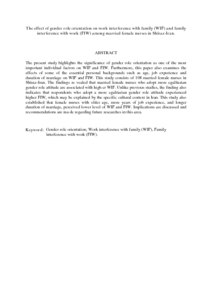Citation
Namayandeh, Hajar and Yaacob, Siti Nor and Juhari, Rumaya
(2010)
The effect of gender role orientation on work interference with family (WIF) and family interference with work (FIW) among married female nurses in Shiraz-Iran.
Asian Culture and History, 2 (2).
pp. 165-171.
ISSN 1916-9655; ESSN: 1916-9663
Abstract
The present study highlights the significance of gender role
orientation as one of the most important individual
factors on WIF and FIW. Furthermore, this paper also examines the effects of some of the essential personal
backgrounds such as age, job experience and duration of marriage on WIF and FIW. This study consists of 198
married female nurses in Shiraz-Iran. The findings re
vealed that married female nurses who adopt more
egalitarian gender role attitude are associated with high
er WIF. Unlike previous studies, the finding also
indicates that respondents who adopt a more egalitarian gender role attitude experienced higher FIW, which may
be explained by the specific cultural context in Iran. This study also established that female nurses with older age,
more years of job experience, and longer duration of
marriage, perceived lower level of WIF and FIW. Implications are discussed and recommendations are ma
de regarding future researches in this area.
Download File
![[img]](http://psasir.upm.edu.my/17084/1.hassmallThumbnailVersion/The%20effect%20of%20gender%20role%20orientation%20on%20work%20interference%20with%20family.pdf)  Preview |
|
PDF (Abstract)
The effect of gender role orientation on work interference with family.pdf
Download (83kB)
| Preview
|
|
Additional Metadata
Actions (login required)
 |
View Item |

